MercoPress. South Atlantic News Agency
Tag: Daniel Ortega
-
Monday, July 30th 2018 - 12:23 UTC
The other side of Nicaragua's instability: economic growth could drop from 4.9% to 1%.
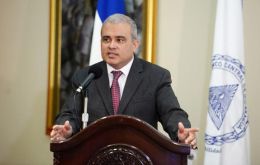
Nicaragua's protracted political crisis, which has lasted well over three months, is impairing economic growth, according to the central bank. Central bank chief Ovidio Reyes said the initial 4.9% growth forecast in gross domestic product (GDP) for 2018 could fall as low as 1% if ongoing protests continue to disrupt daily life.
-
Wednesday, July 18th 2018 - 07:12 UTC
Ortega determined to quell rebellious Masaya by Thursday, Sandinista Liberation Day
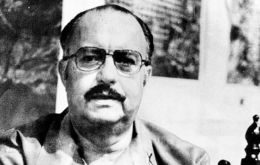
Nicaraguan national police and armed pro-government civilians laid siege to a symbolically important neighborhood that has recently become a center of resistance to President Daniel Ortega's government. Government forces began advancing on the Monimbo neighborhood in the city of Masaya before dawn Tuesday.
-
Tuesday, July 17th 2018 - 09:49 UTC
Nicaragua: UN Secretary General deplores and condemns violence against civilians

United Nations Secretary-General António Guterres on Monday deplored and condemned the ongoing violence against civilians, including against students, in Nicaragua.Speaking on behalf of Mr. Guterres at the UN Headquarters, Deputy Spokesman Farhan Haq told reporters that “the use of lethal force is not only unacceptable but is also in itself an obstacle to obtaining a political solution to the current crisis”.
-
Thursday, July 12th 2018 - 05:49 UTC
Nicaragua unrest kills 264: Ortega and opposition face each other amid crisis
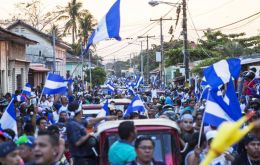
The Nicaraguan opposition will intensify its pressure against President Daniel Ortega on Thursday, with a demonstration and a general strike, but the government, in counteroffensive, prepares its revolutionary commemoration march towards Masaya, the most rebellious city in the country where at least 14 people died last weekend due a raid between pro-government paramilitary and protesters.
-
Thursday, July 12th 2018 - 03:07 UTC
IACHR says death toll from Nicaraguan unrest up to 264
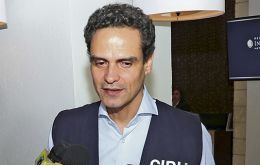
Anti-government protests in Nicaragua have led to a known death toll of 264, the Inter-American Commission on Human Rights said Wednesday after four months of unrest, while some 1,800 people have been injured.
-
Tuesday, July 10th 2018 - 08:16 UTC
Violence in Nicaragua leaves the dialogue in suspense
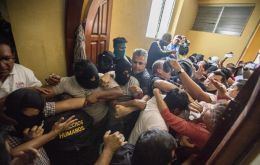
14 lives claimed the increase of violence in Nicaragua, which is about to break the the dialogue to resolve the crisis that left some 250 dead in almost three months of protests against President Daniel Ortega.
-
Wednesday, June 20th 2018 - 09:05 UTC
Ortega's paramilitary groups on shooting spree against protestors; Church dialogue backed talks collapse
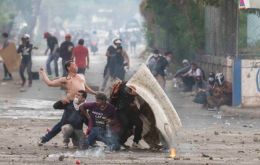
Three people were shot dead in the city of Masaya as security forces and para military groups tried to regain control of the area, a human rights group reported on Tuesday, the two-month anniversary of political unrest that has shaken Nicaragua.
-
Friday, June 15th 2018 - 16:21 UTC
Nicaragua crisis: Many seek to flee the country
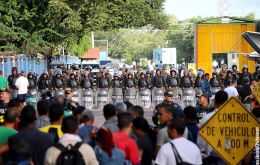
As the crisis worsens in Nicaragua, pressure on the part of society that demands the resignation of President Daniel Ortega remains. This generates that, in many cities like Masaya, the streets are blocked with more than 200 barricades while their neighbors organize to guarantee security and collect food for the protesters who are entrenched, resisting the paramilitary siege against the city. However, there has been an overflow of passport applications in recent weeks.
-
Friday, June 15th 2018 - 10:48 UTC
Ortega launches deadly police and paramilitary repression against activists in Nicaragua
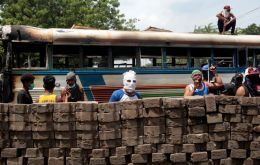
Activists faced off with Nicaraguan pro-government forces in hours of deadly clashes on Thursday amid a nationwide strike to protest government repression of dissent that has left at least 162 dead, including an altar boy. Despite the 24-hour work stoppage that gave the capital Managua the air of a ghost town, fierce unrest in other areas persisted, leaving at least four dead during pro-government attacks on activists guarding barricades.
-
Saturday, June 2nd 2018 - 08:09 UTC
Nicaragua's husband-wife team ready to fall: end of the road for the Ortegas

By Gwynne Dyer (*) - From the Ceausescus in Romania (overthrown and shot 1989) to the Mugabes (removed in a non-violent military coup 2017), husband-and-wife teams running authoritarian regimes seem to have a particularly high casualty rate. And now it may be the turn of the Nicaraguan team: President Daniel Ortega and his wife, Vice-President Rosario Murillo.
